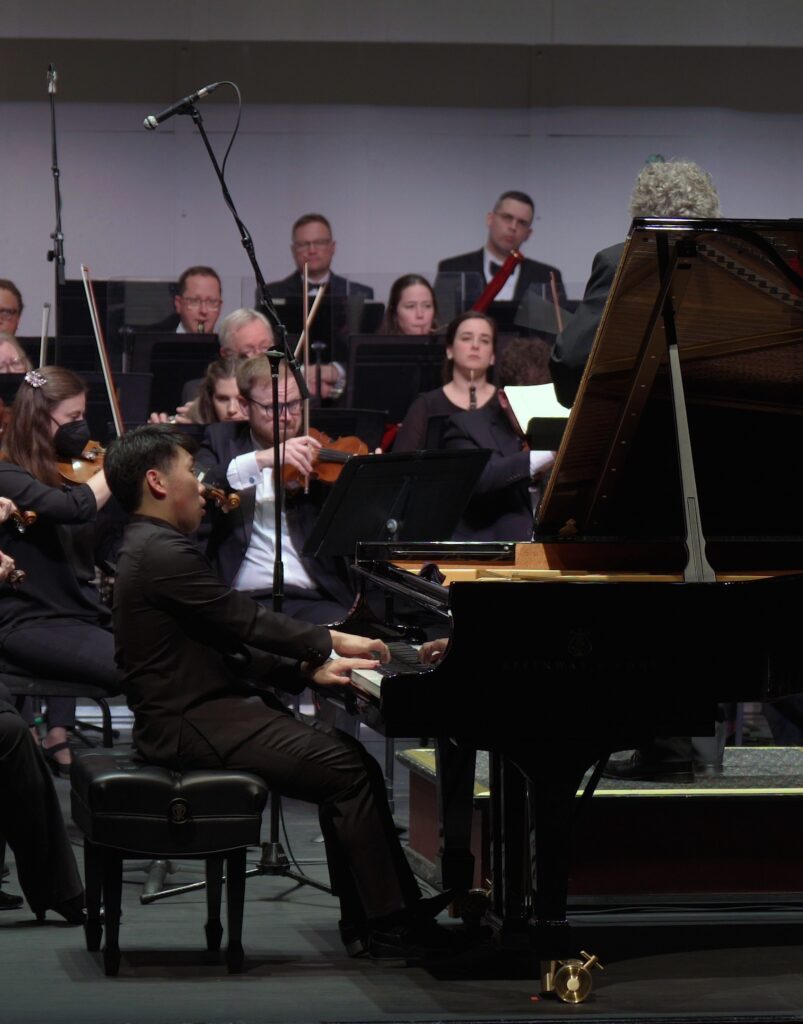Fairfax Symphony rises to the occasion in a night of Romantic blockbusters

George Li performed Rachmaninoff’s Piano Concerto No. 2 with Christopher Zimmerman conducting the Fairfax Symphony Orchestra Saturday night.
The Fairfax Symphony Orchestra continued its 65th anniversary season Saturday evening with a program of expansive Romantic music. Christopher Zimmerman led works of Edward Elgar and Sergei Rachmaninoff, at the GMU Center for the Arts, which co-presented the concert.
The evening began with familiar Elgar, the Pomp and Circumstance March No. 1. One will soon be hearing the middle section of this piece everywhere at American commencement ceremonies. Anglophiles, on the other hand, will associate it with the words of the poem “Land of Hope and Glory,” as sung at the Last Night of the Proms. The musicians infused that middle section with valedictory solemnity, albeit with some lack of unity in the string sections in the fast outer sections.
Pianist George Li returned to the FSO as soloist in Rachmaninoff’s Piano Concerto No. 2. The one-time child prodigy, now 27, has enjoyed a major career since winning a silver medal at the Tchaikovsky Competition in 2015.
The strengths of his interpretation of this most famous of concertos became clear in the first movement. His melting legato touch and freedom of phrasing paid dividends in the tender second theme. At the same time his powerful technique delivered in the demanding complexities of the piece. One element lacking was sheer power, evident from the booming chords of the introduction, which was needed at crucial times to hold his own against the might of the full orchestra.
This made the second movement the highlight of the evening, right from the lush orchestral introduction. Li accompanied the orchestra with exceptional sensitivity, interweaving his part delicately with solos by flute and other instruments. A few weaknesses appeared here and there—in the bassoon solos and some wayward flute intonation issues—while the tone of the amassed violin sections soared.
Li and Zimmerman agreed on a rather feisty tempo for the Finale. Minor cracks arose in the soloist’s formidable technique in the complicated main theme, but both orchestra and pianist propelled the movement forward with abandon, ensuring a hearty ovation. In response, Li leaned again on his poetic side for a ruminative encore, the “Dance of the Spirits” from Gluck’s Orfeo ed Euridice, as arranged by Giovanni Sgambati.
It may have been a stretch for this hard-working regional orchestra to tackle Elgar’s vast First Symphony but they deserve kudos for rising to the occasion. (The orchestration, although otherwise complete, was missing only the second harp.)
Elgar’s symphonies do not get the playtime they deserve in the Washington area, displaced perhaps by far too many airings of his Enigma Variations. Zimmerman advocated for the First Symphony in a lengthy introduction to the second half of the concert, and rightly so. His interpretation felt leaner, timing out at around fifty minutes, closer to what we know of how Elgar himself conducted the piece than the more expansive readings of many later conductors.
The opening theme, a thoroughly English, solemn processional marked “Nobilmente e semplice,” could have been warmer and more elegiac from the winds and violas. Yet the orchestra responded with urgency in the faster Allegro section. There were passing sour notes, including in the violin solos; similar problems cropped up in the ragtag second movement, a scherzo in all but name, but there was also playing of obsessive thoroughness from the string sections and sharp brass accents.
That memorable opening theme, the kernel of the whole symphony, returned nostalgically in the second and third movements. The latter was the performance’s great achievement, an ode of gorgeous longing, especially the hushed section for muted strings. Zimmerman paced the Finale with care, ramping up the excitement over the course of the last ten minutes, so that the triumphant reworking of the main theme hit with maximum exultation. Listeners can only hope that we hear more of Elgar’s lesser-known works from Zimmerman in the future.
Zuill Bailey joins the Fairfax Symphony Orchestra for Dvořák’s Cello Concerto, plus music by Montgomery and Nielsen, 8 p.m. May 13. fairfaxsymphony.org
